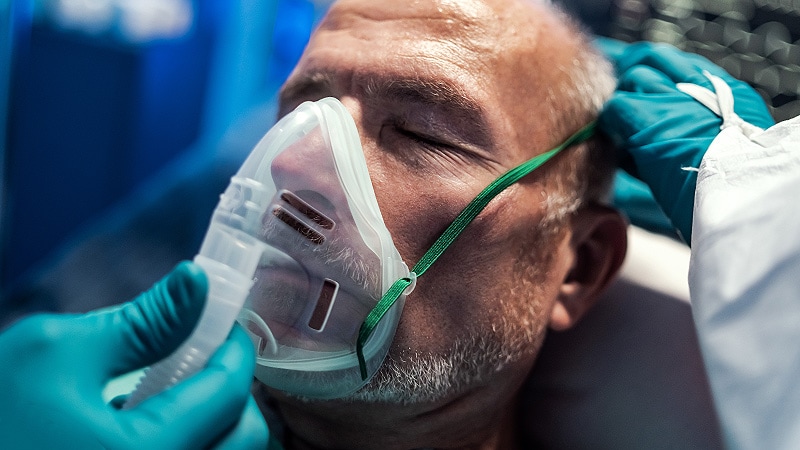Has COVID Swayed the Rise in Pneumococcal Disease in Spain? - Medscape

Before COVID-19 vaccines were widely available, one of the most common and serious manifestations of SARS-CoV-2 infection was pneumonia. Therefore, it is logical to ask whether the COVID-19 pandemic has played a role in the increase in Spain in the number of cases of pneumococcal disease caused by antibiotic-resistant strains. The instinctual response is that there should be no relationship, since COVID-19 is a viral disease and therefore should not be treated with antibiotics. But a significant number of people who developed pneumonia of viral origin were treated with antibiotics to prevent bacterial coinfections. Therefore, there could indeed be a relationship between the COVID-19 pandemic and an increase in cases of antibiotic-resistant pneumonia.
Although it is still too early to answer this question, a study coordinated by researchers from the Pneumococcus Reference Laboratory of the National Microbiology Center of the Carlos III Health Institute (ISCIII) and the Center for Network Biomedical Research on Respiratory Diseases (CIBERES) found indications that such a relationship may in fact exist.
Evolution of Resistance
The purpose of the study carried out by ISCIII, CIBERES, and Meiji Pharma Spain researchers, which was recently published in The Lancet Microbe, was not to analyze the relationship between COVID-19 and antibiotic-resistant pneumonia. It had a broader goal: to characterize antibiotic resistance of pneumococcus in Spain between 2004 and 2020 in the adult population. Because this period included the year 2020, it is possible to study the impact of the pneumococcal vaccines and the epidemiologic changes in the pattern of antimicrobial resistance during the first year of the COVID-19 pandemic.
To carry out this national surveillance study, researchers analyzed 3017 clinical isolates of pneumonia that were unresponsive to penicillin treatment received at the Spanish Pneumococcus Reference Laboratory between 2004 and 2020. These isolates were from adults hospitalized with invasive pneumococcal disease or nonbacteremic pneumococcal pneumonia. Adults who also had meningitis were excluded.
The results showed that the introduction of 7- and 13-valent conjugate vaccines in Spain in the pediatric population has been very effective in reducing the burden of disease caused by resistant strains of pneumococcus in the adult population, thanks to the phenomenon of herd immunity.
However, the data showed a worrying trend: an increase in serotypes not included in the 13-valent vaccine, mainly 11A and 24F. "These data should put us on alert, because precisely these two serotypes are associated with resistance to antibiotic treatment, which is obviously a public health concern," study authors Mirian Domenech, MD, PhD, and José Yuste, MD, PhD, researchers at the National Center of Microbiology (CNM), told Univadis Spain.
Increase in Resistance
Taking advantage of the fact that in this study, data were collected from 2019 (before the COVID-19 pandemic) and 2020 (during the pandemic), researchers analyzed the effect of SARS-CoV-2 on the antimicrobial susceptibility of Streptococcus pneumoniae. The data showed that from 2019 to 2020, there was an increase in resistance to antibiotics of the β-lactam and macrolide types. The explanation may be "the widespread use of these particular drugs for preventive purposes in patients infected with the SARS-CoV-2 virus to avoid bacterial coinfections," said Domenech and Yuste. Although these results may raise concerns, they reflect the situation before there were COVID-19 vaccines. "Now, with a much smaller number of people hospitalized for COVID-19 pneumonia, the widespread use of these antibiotics is also expected to be declining," said the CNM scientists.
Fighting Antibiotic Resistance
One way to reduce antibiotic resistance against these emerging serotypes is to use conjugate vaccines with a broader spectrum, such as those recently approved by the Spanish Agency of Medicines and Medical Products and European Medicines Agencies. But this is not the only way. There are also antibiotics that show a better response, said Domenech. "Cefotaxime, administered parenterally, and cefditoren, administered orally, showed lower levels of antibiotic resistance in pneumococcus vs the aforementioned emerging serotypes." However, "we should not fall into their widespread use because they could cause the appearance of serotypes that are resistant to them," Domenech concluded.
The study was funded by the Ministry of Science and Innovation, Meiji Pharma Spain, and the Carlos III Health Institute.
This article was translated from Univadis Spain.

Comments
Post a Comment